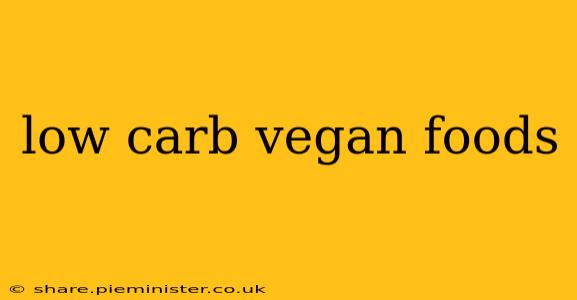Going vegan and following a low-carb diet might seem like a challenging combination, but it's entirely achievable and offers numerous health benefits. This comprehensive guide explores the best low-carb vegan foods, addressing common questions and concerns to help you navigate this dietary approach successfully.
What are the best low-carb vegan foods?
The cornerstone of a low-carb vegan diet lies in focusing on non-starchy vegetables, healthy fats, and moderate amounts of protein-rich foods. Here's a breakdown:
Non-Starchy Vegetables: The Foundation of Your Diet
These are your allies in a low-carb vegan lifestyle, providing essential vitamins, minerals, and fiber without significantly impacting your carb intake. Aim to fill the majority of your plate with these:
- Leafy Greens: Spinach, kale, lettuce, collard greens – these are incredibly low in carbs and packed with nutrients.
- Cruciferous Vegetables: Broccoli, cauliflower, Brussels sprouts, cabbage – these offer a good source of fiber and various beneficial compounds.
- Other Low-Carb Vegetables: Asparagus, zucchini, bell peppers (especially green), mushrooms, eggplant, green beans, cucumbers, avocado (technically a fruit, but fits the profile).
Healthy Fats: Crucial for Satiety and Nutrient Absorption
Healthy fats are vital for a low-carb vegan diet, keeping you feeling full and helping your body absorb fat-soluble vitamins.
- Avocado: A versatile fruit packed with healthy monounsaturated fats and fiber.
- Nuts and Seeds: Almonds, walnuts, chia seeds, flax seeds (in moderation due to higher carb content compared to others), pumpkin seeds – provide healthy fats and protein, but watch portion sizes.
- Nut Butters: Almond butter, cashew butter (in moderation), sunflower seed butter – use sparingly due to their calorie density.
- Olive Oil: A cornerstone of the Mediterranean diet, offering heart-healthy monounsaturated fats.
- Coconut Oil: Provides medium-chain triglycerides (MCTs), which are quickly metabolized for energy. Use in moderation.
Protein Sources: Maintaining Muscle Mass and Satiety
Protein is essential for muscle maintenance and satiety. These options are crucial for your low-carb vegan diet:
- Tofu and Tempeh: These soy-based products offer a good source of protein, but be mindful of their carbohydrate content; choose firm or extra-firm tofu for lower carbs.
- Edamame (Soybeans): A good source of protein and fiber, but again, be mindful of the carbohydrate content.
- Hemp Seeds: Provide a complete protein profile and healthy fats.
- Nutritional Yeast: A deactivated yeast with a cheesy flavor, adds protein and B vitamins.
What are some low-carb vegan recipes?
Numerous delicious and satisfying low-carb vegan recipes are available. Search online for "low-carb vegan recipes" to find a wide variety, focusing on those using the ingredients listed above. Many recipes focus on vegetable-centric dishes, stir-fries, salads with healthy fats, and tofu/tempeh-based meals.
Are there any low-carb vegan protein powders?
Yes, many low-carb vegan protein powders exist on the market. They are typically derived from sources like brown rice, pea protein, soy protein isolate, or a blend of these. Always check the nutritional label to ensure the product aligns with your low-carb goals, paying close attention to the carbohydrate content per serving.
How many carbs should I eat on a low-carb vegan diet?
The ideal carbohydrate intake varies depending on individual factors like activity level, metabolism, and health goals. Consult a registered dietitian or healthcare professional for personalized guidance. A general range for a low-carb diet is typically between 20-50 grams of net carbs per day, but this is not universally applicable and needs individual consideration.
Can I lose weight on a low-carb vegan diet?
A well-planned low-carb vegan diet can support weight loss. By focusing on whole, unprocessed foods rich in fiber and nutrients, while controlling carbohydrate intake, you can create a calorie deficit, leading to weight loss. However, remember that sustainable weight loss requires a balanced approach, including regular exercise.
What are the potential benefits of a low-carb vegan diet?
A low-carb vegan diet, when properly planned, can offer various potential benefits, including:
- Weight management: Reduced carbohydrate intake can support weight loss.
- Improved blood sugar control: Lower carb intake can benefit individuals with type 2 diabetes or insulin resistance.
- Increased satiety: High fiber and healthy fat intake leads to feeling fuller for longer.
- Reduced inflammation: Many plant-based foods have anti-inflammatory properties.
Disclaimer: This information is for educational purposes only and should not be considered medical advice. Always consult a healthcare professional or registered dietitian before making significant dietary changes, especially if you have underlying health conditions. They can assess your individual needs and guide you in creating a safe and effective low-carb vegan plan.
